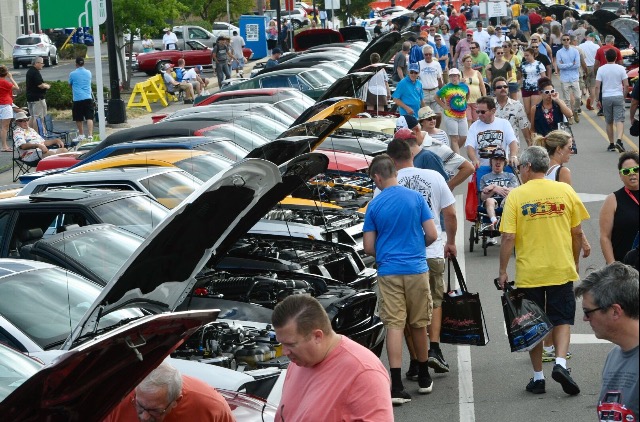
Mustang Row at the Woodward Dream Cruise. Photo by David Guralnick of the Detroit News, shared on Twitter.
Across the United States, it’s car show season. This past week, as many as a million spectators crowded Woodward Avenue north of Detroit, for the annual Woodward Dream Cruise.
In Pebble Beach, California, ultra-expensive collector cars were on display at the annual Pebble Beach Concours d’Elegance.
And, there have been less-extravagant car shows of many sizes in towns around the country — if those car shows weren’t canceled due to the expense, the weather, lack of interest or someone to organize it.
As much as many people love classic cars, there’s a growing concern among the owners of this rolling architecture that nobody will want to take care of the iron that they’ve so lovingly maintained.
Scary data
Even as the elite gathered out west, Fortune Magazine reported that auction estimates at Pebble Beach fell 14 percent, to $290 million. It’s the third straight year in which Pebble Beach auction figures have dropped.
The fear about the future of classic cars also shows up in data from Hagerty, which tracks collector car values for insurance purposes. Their website is a gold mine of information about the value of and future trends in vintage cars.
Right now, there’s a definite reason to worry. Hagerty’s monthly index of collector car values stood at 64.86 in August, falling for the sixth time this year.
Says Hagerty: “The number of owners expressing the belief that the values of their vehicles are increasing continues to gradually decline, and this is true for the owners of both mainstream and high-end vehicles. The drop is particularly pronounced, however, for owners of previously hot models like the Ferrari 308 and Ford GT.”
Now, let’s put the August number in perspective. The index is not at an all-time low, but it’s getting there. That came in September, 2012, when the index stood at 64.01.
The index hit an all-time high in 71.95 in August, 2015. Over the past year, the index has dropped by 3.32 points.
Curbing Cars intern Colin Beresford and I were alerted to the fears over the future of classic cars earlier this summer, when we were guests at First Saturday, the regular meeting of car owners held in Ypsilanti, Mich.
After our talk about the future of transportation, several owners asked us why millennials aren’t interested in classic cars.
Why millennials don’t care
The answer is both financial, and philosophical. Unless you inherit a classic car, it’s likely to be something you purchase once your career is underway, and you have some extra money to spend.
Classic cars need garage space, either at home or someplace rented. They have to be insured. There’s upkeep. And there’s the cost of taking them from show to show, either on wheels or by trailer.
Millennials, at this stage, may not have garages or even a vehicle. Some are still on their parents’ car insurance. Most important, they are paying off student loans, which now average $37,000 for the typical graduate.
Even if they love classic cars, the investment required to purchase, store, maintain and insure one is out of many millennials’ reach.
And, that’s if they love them. Today’s millennials, born in 1982 or later, came after the implementation of Corporate Average Fuel Economy standards, which forced the downsizing of vehicles and a focus on aerodynamics. They missed out on muscle cars, on the Ford Mustang, on everything that preceded them.
So, if they do love classic cars, it’s an acquired taste, not because they’ve observed them in their daily lives. And, which they might enjoy riding in their uncle’s original Ford Thunderbird or their aunt’s Mercedes gullwing, that doesn’t mean they want to be responsible for it.
One owner told us that none of his children were interested in inheriting his cars, and his grand children were still too young to drive. “What’s going to happen to them?” he asked us. I advised him to expose the youngsters to them, but be prepared to sell them if he couldn’t pique their interest.
At least for now, there are enough Boomer and Gen Xer enthusiasts to keep events like the Dream Cruise afloat. The Metro Detroit Convention and Visitors Bureau says the Dream Cruise infused $240 million in the local economy this year, from hotel rooms to restaurant meals.
But, it’s a backward looking hobby at a time when the future of the industry is at a crossroads.
